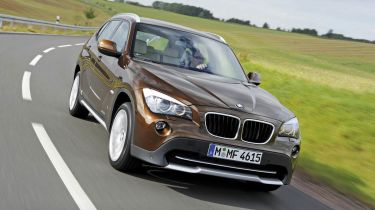BMW X1
German giant’s suv range is now complete, with 1-series-based model. We give our verdict on firm’s smallest 4x4.

The X1 isn’t revolutionary. As with all crossover vehicles, it doesn’t make a lot of sense on paper – it isn’t a full off-roader and doesn’t offer the practicality of an estate. But it’s sure to be a big sales success. By combining a raised body with decent handling, low emissions, punchy diesel engines and top quality, the BMW brings premium badge appeal to the small crossover segment. And it will appeal to motorists downsizing from larger SUVs and those wanting to step up from premium hatchbacks.
Is this another BMW SUV with the X Factor? Having taken the 4x4 world by storm a decade ago with the X5, and then reinventing the class with the coupé-styled X6, the German company knows a thing or two about carving a new niche.
Now, with the introduction of the all-new X1, BMW is the first premium brand to enter the small crossover segment. It’s an area that until now has been dominated by the likes of the Nissan Qashqai and VW Tiguan.
Video: watch CarBuyer's video review of the BMW X1
[[{"type":"media","view_mode":"content_narrow","fid":"68468","attributes":{"alt":"","class":"media-image"}}]]
As X models now account for one in five of BMW global sales, it’s easy to see the business logic in launching a smaller model that appeals to buyers who are looking to downsize.
The X1 is built alongside the 1-Series, and shares the kidney grille, jewel-like headlights and long bonnet of its hatch cousin. In profile, the shoulder line stands out, while the raised ride height and roof rails give it the same look as other X models.
Inside, the driving position is what BMW describes as ‘semi-command’. You sit higher than in a conventional car, but don’t get the really lofty view of a large 4x4. Nevertheless, the smart dash design and array of stowage solutions make the
X1 very accommodating. While there are some cheap plastics below eye level, build quality is robust and all the controls feel very well engineered.
Rear passenger space is on a par with a 3-Series, although headroom is better due to the higher roofline. Plus, the rear seatbacks adjust. The 420-litre boot is fractionally bigger than in most family hatchbacks and the seats fold flat, but while this means the X1 is more flexible than the 1-Series, it isn’t massively practical.
Where it scores is with its driving experience, bringing BMW’s usual involvement to the crossover sector. And for the first time, an X model is being offered with a choice of two or four-wheel drive.
The cheaper sDrive variants put their power down through the rear wheels, while xDrive versions are 4x4 and get hill descent control as standard.
Off-roading isn’t likely to be on most owners’ agenda, though, and on the tarmac the X1 feels incredibly similar to BMW’s conventional cars. The steering is precise and there is plenty of feedback.
Used - available now
The brakes are strong, too, while through corners there’s a reassuring amount of grip. Body control is good as well, but the ride is firm and the X1 is unsettled by rough surfaces. Despite its dynamic abilities, it doesn’t offer much in the way of driver fun, though.
In the UK, buyers will only be able to buy the newcomer as a diesel. Petrol versions will be offered in Europe, but as oil-burners dominate the SUV market in this country, only the 18d, 20d and twin-turbo 23d will be sold in dealers here.
We drove the 2.0d xDrive, which delivered great traction through its four-wheel-drive transmission. The 175bhp diesel is mated to a six-speed manual gearbox as standard, and gives decent performance.
A stop-start system ensures the X1 is clean, too. It emits an impressive 153g/km of CO2. Opt for the rear-driven 2.0d sDrive, and this is reduced to 139g/km. And if you go for the entry-level 141bhp 18d sDrive, its output is a mere 136g/km.
Stop-start isn’t offered with the optional automatic box, but due to its compact size this is BMW’s greenest 4x4 to date, whichever version you choose.
Standard kit is decent on all variants, while key options include a reversing camera, panoramic glass sunroof, adaptive lights and an iDrive cabin control system with navigation. Prices range from £22,660 to £29,055. For now, the BMW has the premium compact SUV market to itself. But with its MINI Crossman sister car due next year, and Audi’s Q3 on the horizon, that won’t be the case for long.
Rival: Volkswagen Tiguan
The Tiguan comes in front or four-wheel-drive formats, and has a wide range of engines. It hasn’t got the badge kudos of the BMW, but is a classy choice all the same. And it’s also more affordable, with prices starting at £18,645.










